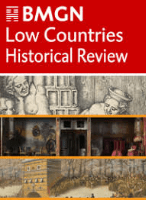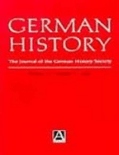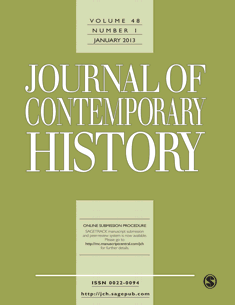
Casopis za Suvremenu Povijest
Scope & Guideline
Fostering Innovative Perspectives on Modern History
Introduction
Aims and Scopes
- Historical Analysis of Yugoslav History:
The journal emphasizes in-depth historical research on the political, social, and cultural developments in the Yugoslav region, especially during key historical periods such as World War I, World War II, and the post-war era. - Interdisciplinary Approaches:
Utilizing methodologies from various disciplines, including sociology, political science, and cultural studies, the journal encourages diverse perspectives and interpretations of historical events and phenomena. - Focus on Memory and Identity:
The publication often explores themes of collective memory, national identity, and the legacies of historical events, reflecting on how these aspects shape contemporary society in the region. - Critical Examination of Political Narratives:
The journal critiques and analyzes political discourses and narratives surrounding historical events, especially in the context of nationalism, communism, and post-communist transitions. - Documentation and Archival Research:
Emphasizing the importance of primary sources, the journal publishes studies that rely heavily on archival research, providing new insights into previously under-explored historical topics.
Trending and Emerging
- Post-Yugoslav Identity and Memory:
There is a growing focus on the complexities of identity and memory in the post-Yugoslav context, examining how historical narratives influence current national and ethnic identities. - Impact of Technology on Historical Research:
Emerging themes include the use of digital humanities and technology in historical research, highlighting how new tools are transforming the study and dissemination of history. - Environmental History:
Increasing attention is being paid to environmental history, particularly regarding the impacts of industrialization and war on the environment in the Yugoslav region. - Gender Studies in History:
The journal is seeing an increase in publications addressing gender dynamics and women's roles in historical contexts, reflecting broader trends in the social sciences. - Contemporary Political Issues:
Recent publications have started to engage more with contemporary political issues, including nationalism, migration, and human rights, linking historical contexts to present-day challenges.
Declining or Waning
- Traditional National Histories:
There is a noticeable decline in articles focused solely on traditional national histories, as the journal increasingly favors interdisciplinary and comparative approaches that transcend national narratives. - Cold War Studies:
Research centered on the Cold War dynamics specific to Yugoslavia has diminished, possibly due to a shift in focus towards examining post-Cold War developments and contemporary issues. - Biographical Studies:
Although biographical studies were once a staple, there is a waning interest in individual biographies, particularly those that do not connect to broader historical themes or collective experiences. - Military History Focus:
While military history remains relevant, the journal has seen fewer publications centered exclusively on military events or figures, in favor of broader socio-political analyses. - Local History Emphasis:
The trend towards localized historical studies has decreased, with more emphasis placed on transnational and regional analyses that provide a wider context.
Similar Journals

BMGN-The Low Countries Historical Review
Navigating the Intricacies of Low Countries HistoryBMGN-The Low Countries Historical Review, published by the KONINKLIJK NEDERLANDS HISTORISCH GENOOTSCHAP, is a distinguished open-access journal dedicated to the study of the history of the Low Countries, offering insights and diverse perspectives on historical developments from the region. With an ISSN of 0165-0505 and an E-ISSN of 2211-2898, this journal has been a valuable resource since its inception in 1970, with its rich archive covering pivotal years including 1975 and periods from 1999 to 2002, as well as the continuous series since 2009. With a notable impact factor supporting its reputation—scoring a commendable Q3 in History and achieving the 85th percentile rank within the Arts and Humanities category—BMGN is instrumental in fostering scholarly dialogue and advancing historical discourse. The journal's open-access format ensures broad access to its content, supporting researchers, professionals, and students keen to explore the intricate tapestry of Low Countries history. With its office located in The Hague, Netherlands, BMGN continues to be a pivotal forum for historical engagement and publication.

German History
Advancing Scholarship in German Historical StudiesGerman History is a leading academic journal published by Oxford University Press, focusing on the rich and multifaceted history of Germany from the medieval period to contemporary times. With a strong emphasis on interdisciplinary approaches, this journal invites contributions that explore social, cultural, political, and economic aspects of German history. Established in 1984, and with comprehensive publication coverage from 1984 to 1994 and from 1996 to 2024, German History occupies a significant place in the historical field, currently ranked in the Q2 category as per the 2023 Scopus rankings. Although it does not offer open access options, the journal continues to uphold academic rigor and scholarly excellence, making it a crucial resource for researchers, professionals, and students engaged in the study of German history. With a commitment to fostering high-quality research and dialogue, German History remains an essential platform for critical discourse and groundbreaking scholarship in the field.

SOUTHEASTERN EUROPE
Fostering Scholarly Dialogue on Southeastern European DynamicsSOUTHEASTERN EUROPE is a prestigious academic journal published by BRILL, focusing on the multidimensional analysis of the Southeastern European region. Established in the 1970s, the journal has evolved to become a vital resource for scholars in Cultural Studies, History, and Political Science. With its impact factor reflecting a robust influence within the academic community—ranking in the Q2 category for Cultural Studies and Q1 for History as of 2023—it serves as a critical platform for disseminating high-quality research and discourse. The journal supports various access options for its readers, ensuring a wide reach within both academic and policy-making circles. With a rich archive of issues from 1976 through to 2023, SOUTHEASTERN EUROPE is dedicated to fostering interdisciplinary dialogue and providing nuanced insights pertinent to the historical and sociopolitical dynamics of the region. For researchers, professionals, and students alike, this journal remains an essential tool for understanding the complexities and evolving narratives of Southeastern Europe.

JOURNAL OF CONTEMPORARY HISTORY
Championing Academic Excellence in Contemporary HistoryJOURNAL OF CONTEMPORARY HISTORY, published by SAGE PUBLICATIONS LTD, is a premier academic journal dedicated to the exploration of modern historical narratives and contemporary societal issues. Established in 1966, this journal has influenced scholarly discourse through a rich repository of research, analyses, and critical reflections, providing invaluable insights into cultural studies, sociology, and political science. With an impressive Q1 ranking in History and a notable Q2 ranking in Cultural Studies for 2023, it stands out in the academic community, ensuring rigorous peer-reviewed content that meets the highest scholarly standards. The journal is accessible through conventional subscriptions, reflecting its long-standing commitment to academic excellence. Based in the United Kingdom, it continues to serve as an indispensable resource for researchers, professionals, and students alike, bridging the gap between historical context and contemporary relevance.

Novyi Istoricheskii Vestnik-The New Historical Bulletin
Celebrating the Complexity of History in Every Issue.Novyi Istoricheskii Vestnik - The New Historical Bulletin, published by IZDATEL STVO IPPOLITOVA, stands as a significant academic platform in the field of history, particularly within the Russian context. With an ISSN of 2072-9286 and established in 2012, this journal aims to foster rigorous scholarship and innovative research in historical studies, enhancing discourse amongst historians, researchers, and students alike. Although it currently holds a Q3 ranking in the Arts and Humanities - History category, its commitment to showcasing diverse historical narratives and promoting academic dialogue positions it as a noteworthy contributor to the field. The journal's scope covers a wide array of historical topics, encouraging submissions that illuminate various aspects of the past, whilst also serving as a vital resource for those seeking to understand contemporary historical discourse. As an open access journal, it promotes the accessibility of scholarly work, appealing to a broad audience intent on expanding their knowledge of history.

Radovi Zavoda za povijesne znanosti HAZU u Zadru
Pioneering Research in Croatian Historical ContextsRadovi Zavoda za povijesne znanosti HAZU u Zadru is a prominent academic journal published by the HRVATSKA AKAD ZNANOSTI UMJETNOSTI, dedicated to advancing the field of historical sciences. With an ISSN of 1330-0474, this journal plays a crucial role in disseminating research and scholarly articles that cater to historians, researchers, and students interested in the complexities of history, particularly in the context of Croatia and Central Europe. Despite its current categorization in the Q4 Quartile of the History category, it offers a unique platform for emerging and established scholars to publish innovative research, fostering a community engaged in historical discourse. Accessible from Zadar, Croatia, the journal invites contributions that explore various historical themes and methodologies from 2009 to 2023, making it essential reading for anyone invested in the historical sciences.

Lithuanian Historical Studies
Unveiling the Depths of Cultural HeritageLithuanian Historical Studies is a respected academic journal published by BRILL, focusing on the nuanced exploration of cultural, historical, and sociopolitical dynamics within Lithuania and its historical context. With an ISSN of 1392-2343 and an E-ISSN of 2538-6565, this journal aims to disseminate scholarly research that contributes to the understanding of Lithuania's cultural heritage and historical developments. Although it operates without an open-access model, its content is essential for researchers, professionals, and students interested in History, Cultural Studies, and Religious Studies. Ranked in the fourth quartile across several categories in 2023, including Cultural Studies and Sociology and Political Science, it provides a platform for academic discourse among those researching in the field. Despite its modest Scopus rankings, it plays a critical role in advancing knowledge within these disciplines and fostering dialogue across them, making it a valuable resource for anyone engaged in the study of Lithuanian or broader Eastern European history.

Historia Social
Unlocking Historical Perspectives for Today’s ChallengesHistoria Social, published by UNIV NACL EDUCACION DISTANCIA-UNED and FUNDACION INST HISTORIA SOCIAL, is a prominent academic journal dedicated to the comprehensive exploration of social history and its intersections with sociology and political science. Established to foster scholarly discourse, the journal has achieved an impressive Q1 ranking in History and Q3 ranking in Sociology and Political Science as of 2023, reflecting its significant contribution to the field. Hailing from Spain, it engages a global audience with its rigorous peer-reviewed articles, aiming to illuminate the intricacies of historical narratives and their implications on contemporary social issues. With a Scopus rank of #333 out of 1760 in History, serving as an essential resource for researchers, professionals, and students, Historia Social invites submissions that deepen our understanding of the past while informing the present. Its open-access policy enhances accessibility, allowing for broader readership and engagement with vital historical debates.

Chronica Nova
Advancing Scholarly Discourse in HumanitiesChronica Nova is an esteemed academic journal published by UNIV GRANADA, focusing on the rich field of historical and cultural studies. With an ISSN of 0210-9611 and an E-ISSN of 2445-1908, it serves as a vital resource for researchers, professionals, and students interested in exploring diverse aspects of history and its contemporary implications. While currently not available as an open-access publication, Chronica Nova facilitates a platform for the dissemination of knowledge through rigorous peer-reviewed articles, encouraging discourse among scholars and fostering educational advancements in the humanities. Hailing from the picturesque city of Granada, Spain, the journal embodies a commitment to enhancing historical scholarship and cultural understanding, making it an invaluable addition to the academic community.

Historisk Tidskrift
Advancing Historical Discourse Since 1973.Historisk Tidskrift, published by the SVENSKA HISTORISKA FORENINGEN in Sweden, is a pivotal journal in the field of historical studies, holding an ISSN of 0345-469X. With a history dating back to 1973, this journal serves as a platform for disseminating significant research and discussions in the discipline of history. Although it currently operates under a traditional subscription model, the journal's contributions are invaluable, particularly as it seeks to engage with a wide array of historical narratives and methodologies. In the 2023 category rankings, Historisk Tidskrift is positioned in the fourth quartile for History, a testament to its ongoing relevance in scholarly discourse, whilst ranking #1224 out of 1760 in the Scopus database for Arts and Humanities - History. This makes it a crucial resource for historians, researchers, and students alike, dedicated to exploring and expanding the understanding of historical contexts and interpretations.